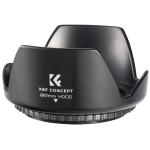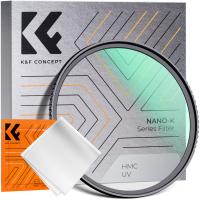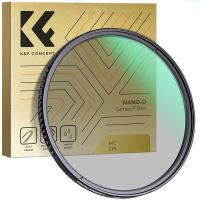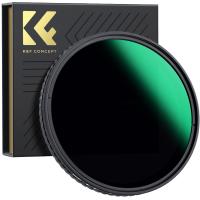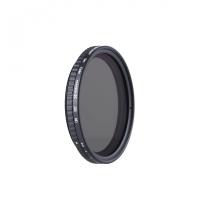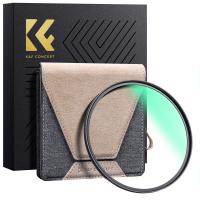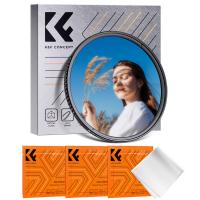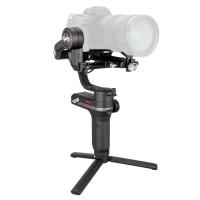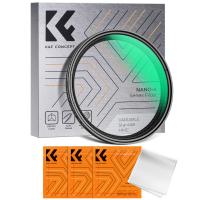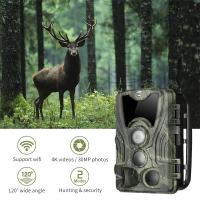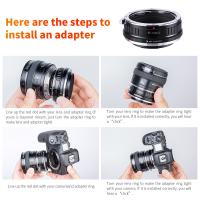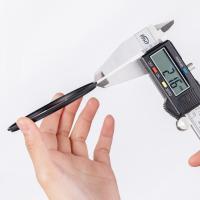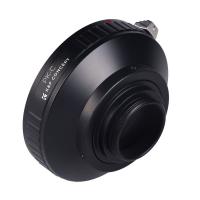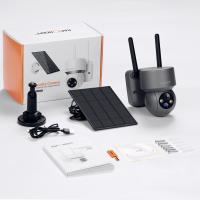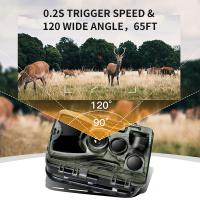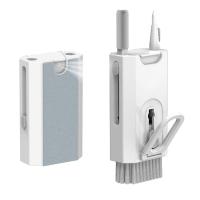Reviews
Fits tight, well made.
I got this for several of the 52mm lenses I have. It threads on smoothly with no wobble and is made of nice, thick plastic.
One of these lenses is a 18-55mm zoom used on a Nikon DSLR with an APS-C format sensor. The manufacturer’s description says not to use this hood on any lens with a wider field of view than 25mm to avoid vignetting (darkening of the edges of the photo). The crop factor for Nikon APS-C sensors is 1.5x, so at 18mm this lens has a field of view comparable to 27mm on a full frame digital camera or a standard 35mm film camera which is usually used as the reference when describing the field of view of lenses attached to cameras which evolved from 35mm film cameras. Look it up to get a better idea of what I’m talking about if you don’t already know. I’m not that keen on it myself.
Anyway, 27mm is uncomfortably close to 25mm so I ran some test shots of an evenly lit yellowish blank wall with the Nikon to check for any vignetting. The camera viewfinder is not 100% accurate so I had to go with the actual pictures. I found no noticeable vignetting at 18mm as long as the hood was oriented with the two largest “petals” pretty close to 12 and 6 o’clock. I found that to achieve the no-vignette at this position, the hood needed to be screwed in all the way – meaning that the lock ring had to be all the way snugged up to the body of the hood. A partial rotation of the ring to secure the hood with the petals at the correct position was okay, but even a few full “backwards” rotations of the lock ring which prevented the hood being screwed down as far as possible started giving me some vignetting.
Even locked down to the right position to start off there’s a slight rotation of the front of the lens to achieve proper focusing (unless you have one of those expensive lenses that have internal focusing), but the movement is fairly minor and didn’t give me any trouble. You probably will have trouble, though, if you screw the hood onto a filter and then try to shoot at 18mm! If using a zoom lens you could cancel any vignette by just selecting a slightly longer focal length at which to shoot.
Apologies for going on, but the take-away is that you shouldn’t have vignette issues using this hood at 18mm on a APS-C format camera. Canon has a 1.6x crop factor which puts you even farther from the 25mm danger zone. If you have a full frame format digital or a 35mm film camera, you would have major issues at 18mm. So, then don’t use any focal length under the 25mm mentioned. Of course, if you are using a zoom lens, you can use it fine at focal lengths greater than 25mm.
I don’t need to penalize this hood by taking away stars as it seems to be well made and does its job very inexpensively.
One of these lenses is a 18-55mm zoom used on a Nikon DSLR with an APS-C format sensor. The manufacturer’s description says not to use this hood on any lens with a wider field of view than 25mm to avoid vignetting (darkening of the edges of the photo). The crop factor for Nikon APS-C sensors is 1.5x, so at 18mm this lens has a field of view comparable to 27mm on a full frame digital camera or a standard 35mm film camera which is usually used as the reference when describing the field of view of lenses attached to cameras which evolved from 35mm film cameras. Look it up to get a better idea of what I’m talking about if you don’t already know. I’m not that keen on it myself.
Anyway, 27mm is uncomfortably close to 25mm so I ran some test shots of an evenly lit yellowish blank wall with the Nikon to check for any vignetting. The camera viewfinder is not 100% accurate so I had to go with the actual pictures. I found no noticeable vignetting at 18mm as long as the hood was oriented with the two largest “petals” pretty close to 12 and 6 o’clock. I found that to achieve the no-vignette at this position, the hood needed to be screwed in all the way – meaning that the lock ring had to be all the way snugged up to the body of the hood. A partial rotation of the ring to secure the hood with the petals at the correct position was okay, but even a few full “backwards” rotations of the lock ring which prevented the hood being screwed down as far as possible started giving me some vignetting.
Even locked down to the right position to start off there’s a slight rotation of the front of the lens to achieve proper focusing (unless you have one of those expensive lenses that have internal focusing), but the movement is fairly minor and didn’t give me any trouble. You probably will have trouble, though, if you screw the hood onto a filter and then try to shoot at 18mm! If using a zoom lens you could cancel any vignette by just selecting a slightly longer focal length at which to shoot.
Apologies for going on, but the take-away is that you shouldn’t have vignette issues using this hood at 18mm on a APS-C format camera. Canon has a 1.6x crop factor which puts you even farther from the 25mm danger zone. If you have a full frame format digital or a 35mm film camera, you would have major issues at 18mm. So, then don’t use any focal length under the 25mm mentioned. Of course, if you are using a zoom lens, you can use it fine at focal lengths greater than 25mm.
I don’t need to penalize this hood by taking away stars as it seems to be well made and does its job very inexpensively.
02/06/2024
Guess you like products
£62.99 £38.99
Guess you like articles
Related searches

